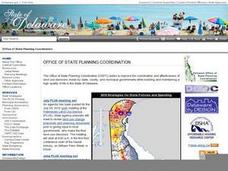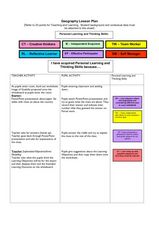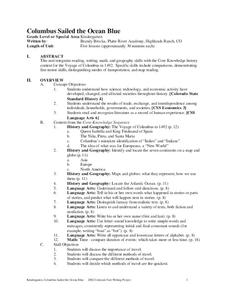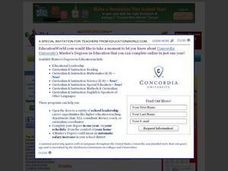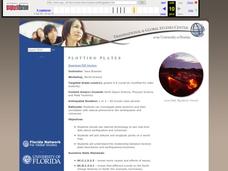Curated OER
Cultures Around the World
Students explore the concept of culture. In this culture lesson, students discuss how clothing, food, celebrations, holidays, and travel contribute to the formation and perpetuation of culture.
Curated OER
Using Charts and Graphs to Study East Asia's Modern Economy
Students examine East Asia's modern economy. In groups, classmates use the internet to compare the resources, products, and economy of specified countries. After collecting the data, pupils create charts, tables and graphs. They...
Curated OER
"Where in the World is my School?"
Students learn new vocabulary and discuss what GPS is and does. They locate their school using the equipment.
Curated OER
Geography Lesson Plan
Students examine the history of the Aborigines. In this Australia lesson, students research selected websites and print materials regarding the lives of the Aborigines and create posters that showcase their findings.
Curated OER
Social Studies: Kyrgyzstan Bride Kidnappings
Students examine the Kyrgyzstan bride kidnappings and compare wedding traditions there with those in the United States. They explain these differences and similarities in a fictitious letter to a peer in Kyrgyzstan.
Curated OER
Seven Wonders of the World: The Hanging Gardens of Babylon
Learners discover the Hanging Gardens through archaeology. In this Near Eastern history lesson, students read the book, Ancient Iraq:Archaeology Unlocks the Secrets of Iraq's Past, by Beth Gruber, then create their own hanging garden.
Core Knowledge Foundation
Columbus Sailed the Ocean Blue
Young adventurers embark on a journey, setting sail along the blue ocean with Christopher Columbus. Teachers will find that this unit makes their lesson planning smooth sailing!
Curated OER
Proverbs of One World
Bring your class to the computer lab, and have them use the library and online resources to select proverbs related to specified themes. They create a book or bulletin board of proverbs that offer lessons connected to themes of freedom,...
Curated OER
Transportation
Engage in an 8-day study of different modes of transportation. Your students explore the concept of location and define the physical characteristics of places, such as, land forms, bodies of water, natural resources, and weather.
Curated OER
Identifying Continents and Oceans
Students locate and identify the four major oceans and the seven continents on a world map. They use an unlabeled world map and compass rose to describe relative locations of the continents and oceans.
Curated OER
Tropical Regions/Mapping Biodiversity
Pupils use a world map to locate the country of Puerto Rico. In groups, they identify the various types of vegetation found on the island. They compare and contrast the biodiversity of the country to the United States. To end the...
Curated OER
Plotting Plates
Students investigate plate tectonics and their correlation with natural phenomena like earthquakes and volcanoes. They use the internet to see real-time data about earthquakes and volcanoes. Students plot latitude and longitude points on...
Curated OER
The Ethics of Outsourcing to China
After viewing clips from a documentary on factory work in China and US outsourcing, learners have a fishbowl discussion. They work in groups to build both personal points of view and strong arguments on the effects of outsourcing in...
Curated OER
Did You Feel That? Earthquake Data Chart
Students plot earthquakes on the world map using coordinates of longitude and latitude. They designate the earthquakes magnitude with a symbol which they include in the map key.
Curated OER
War and the Animal
Students analyze the spatial organization of people, places, and environments in a spatial context. They gain personal insight into the horrors of war and the importance of ethnicity. Students define all key terms, analyze a world map...
Curated OER
Exploring Explorers
Ninth graders illustrate the routes taken by different explorers on a world map. They explain the need for the different exploration voyages. Students explore the web for information that may contain different points of view or...
Curated OER
AT YOUR FINGERTIPS
The student will locate countries on a world map from which we import foods that our climate prevents us from growing locally.1. Discuss the term "export." Divide middle schoolers into groups of four. Give the groups
five minutes to...
Curated OER
The New Californians
Young scholars identify the groups of immigrants who came to California. They trace the route they possibly took to American on a world map. They discuss the reasons why they left their homeland and what challenges they faced once they...
Curated OER
Winter Olympic Torch Traveling Across Italy
Students react to statements about the 2006 Winter Olympics, then read a news article about the Olympic torch's journey through Italy. In this current events lesson (written prior to the 2006 Winter Olympics), the teacher introduces the...
Curated OER
Tracing Our Own Family Pilgrimages
Students observe a world map and are introduced to vocabulary like: cities, continents, rivers, lakes, and oceans. They discuss the names of the cities they live in and locate them on the map; then using a colored pushpin indicate: the...
US Mint
Absolutely and Relatively: The Puerto Rico Quarter Reverse
How much does your class know about Puerto RIco? How much can they learn from the back of a 2009 quarter? Use the coin, part of a series of quarters that depict US territories, to teach learners about the geography, culture, and history...
Curated OER
Making Regolith
You may not be able to take a field trip to the moon, but that doesn't mean your class can't study moon rocks. Using graham crackers as the moon's bedrock and powdered donuts as micrometeorites, young scientists simulate the creation of...
Curated OER
States and Mates
Discuss and reflect on the concept of allies and alliances. The class examines the competition between the United States and Venezuela. Using the New York Times, they search for examples of geopolitical alliances. In addition, they write...
Global Oneness Project
The Value of Ancient Traditions
Imagine having to give up cell phones, computers, and TV? What would be lost? What gained? An examination of the Drokpa, a nomadic people who live in the grasslands of Tibet, provides class members an opportunity to consider how access...




